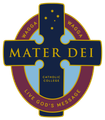Assessment - Avoiding Malpractice in the Submission of Tasks

Assessment - Avoiding Malpractice in the Submission of Tasks
As we commence the new school year, it is timely to remind parents and students about the expectation that all Assessment Tasks are undertaken and completed solely by the student. This is a NESA requirement and it precludes others including parents, siblings, peers and commercial tutoring companies working on Tasks, or editing them. It also prohibits using online resources such as Chatbots to complete Assessment Tasks.
In the completion of all Assessment Tasks, students must adhere to the College’s Malpractice Policy and procedures. These requirements are visible and easily accessible, and are provided on the standard landing page for every CANVAS Course. Students are also instructed and periodically reminded on what constitutes malpractice and plagiarism.
In Year 10 students work through the mandatory All My Own Work module that NESA has designed and the College follows the NESA guidelines related to malpractice.
There has been recent media attention around the ChatGPT computer program. ChatGPT is an artificial intelligence (AI) program which is able to:
- Answer questions and design solutions to problems
- Compose music
- Write student essays
- Create poetry/Lyrics
- Play games, and probably much more
The solution is generated by the program, so the ‘author’ is not a person. This particular application of AI is here to stay; it will be able to be used for many worthwhile and useful applications.
There is obviously the potential for an individual to use ChatGPT and not acknowledge they have, and therefore essentially claim the work as their own.
In the past 2-3 years teachers have been designing Assessment Tasks that are either exclusively or mostly completed during lesson times, in part to ensure that we are confident that student submissions are authentically their own.
This approach will continue and it is likely, with the advent of ChatGPT, that most tasks will be designed to try to minimise the use of any external support. This eliminates the possibility of students not acknowledging sources, resources or expert help that has been used, and instead claiming to be the author of the work.
Encouraging and supporting students to submit their own work so that learning (and what is submitted), is authentic is an ideal that is worth aspiring to.
We ask that parents are aware of our Malpractice Policy and both actively support and challenge your children in understanding the value of producing and submitting their own work.
Mr Laurie Fitzpatrick | Leader of Curriculum
